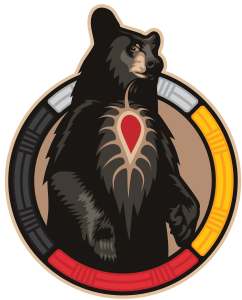
In Connection 8, you will learn from Nipissing First Nation about Nbisiing community-specific wellness.
Note: Connection 8 honours the Nbisiing (Nipissing) language dialect. Some spellings and pronunciations will differ from the earlier connections.
Nbisiing Nishnaabeg Wellness
Communities are accessing their own repositories of knowledge and strengthening their own ways to wellness. Having this specific wellness knowledge can help the self-determination process and relationship development with clients (Peltier et al., 2022).
In this section, you will hear from the gathered knowledge of Nbisiing Debendaagziwaad (Nipissing First Nation citizens) about stories of wellness and what wellness means to them. Through our research, we gathered stories about wellness from Nbisiing Debendaagziwaad. For this community, wellness was understood within 5 themes: Connectedness, Living the Medicine Wheel, Belonging, Experiencing Colonialism, and Reclaiming Nbisiing Nishnaabe Ways. Each theme will be shared through quotes from our research (Peltier et al., 2022) as well as video clips from the Nipissing First Nation documentary, Biidaajwan Force of Water (Nipissing First Nation & Hummingbird Productions, 2022).
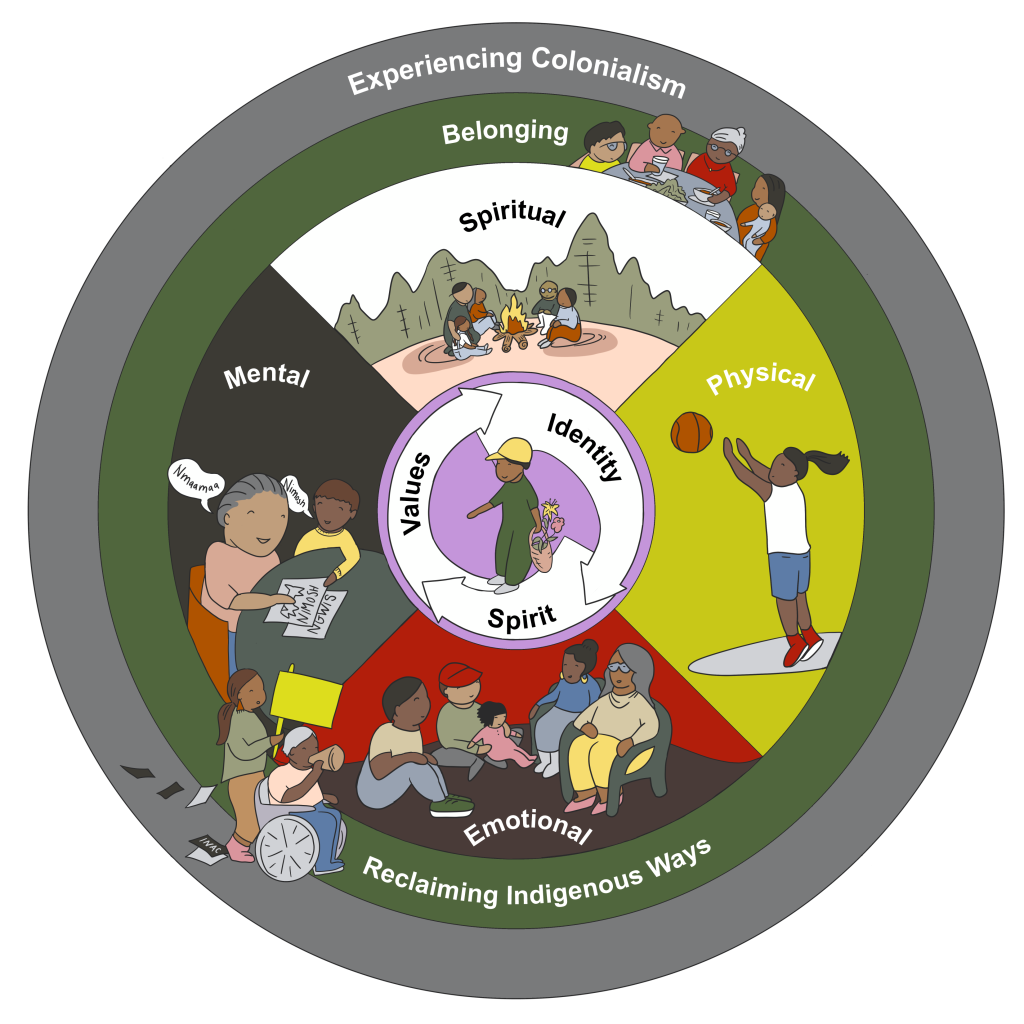 Image Description: Nbisiing Anishinaabe Wellness Model [Doc]
Image Description: Nbisiing Anishinaabe Wellness Model [Doc]![]()
Theme 1: Connectedness
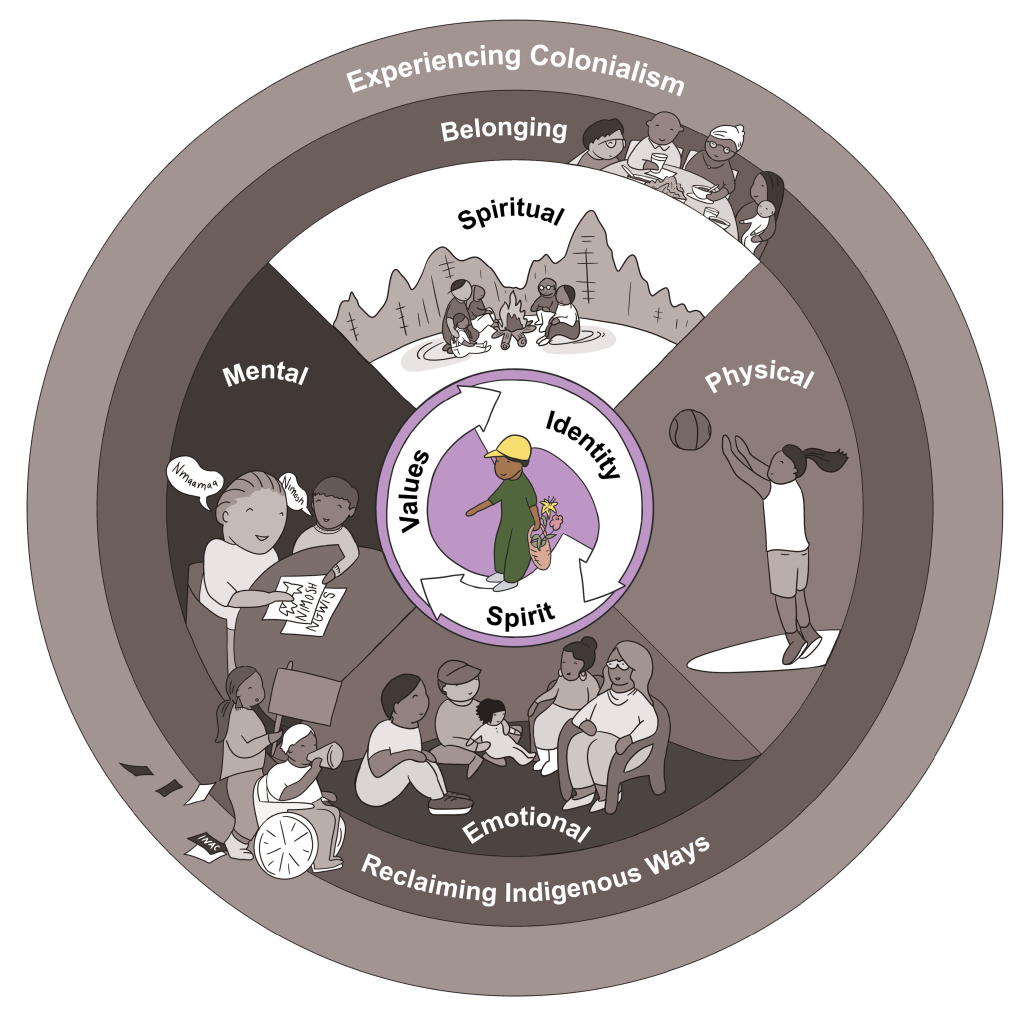 Wellness was understood through 5 themes, Connectedness is Theme 1:
Wellness was understood through 5 themes, Connectedness is Theme 1:
The center of the model represents a person’s connection to Creation and our first theme. “Connectedness is manifested through spirit, identity (who we are), and values (what is important to us). This connection to Creation influences how we live out the teachings of the Medicine Wheel” (Peltier et al., 2022).
The following quotes reflect Nbisiing Debendaagziwaad shared knowledge about connectedness with ancestors, the implications of colonialism on identity, and Nbisiing family values.
“I feel strongly that our ancestors had a lot of faith that things would change and that we would learn to live in a good healthy way with strong moral character. Their example of overcoming hardship would prevail.”
“I think the key … is to move towards a community model of wellness, which to me … begins with identity … One of the key things that the residential school and colonialism did to us is take away our identity”
“I was brought up in a large family… Being raised in a large family you learn how to treat someone else, how to share, how to empathize, sympathize, and then you learn … to look after the other person” (Peltier et al., 2022).
In the following excerpt from Biidaajwan Force of Water [2:17] Nbisiing Debendaagziwad speak about how learning Nbisiing Nishnaabemwin (Nipissing language) promotes connection to their identity and culture while fostering relationships with human and non-human beings, land and ancestors in the Spirit World.
Video Transcript: Theme 01 [Doc]![]()
Checkpoint 19: Quiz
Theme 2: Living the Medicine Wheel
Nbisiing Debendaagziwaad understand wellness to include the interaction of physical, mental, emotional, and spiritual domains of life. For them, wellness is the connection of a person’s spirit demonstrated throughout all life stages, within various identities and shown through their values. This theme, named for living life around the medicine wheel, adheres to an Anishinaabe conception of health and extends beyond the physical dimension (Peltier et al., 2022).
The following quote speaks to this wholistic sense of wellness:
“So, when you used the word mental, people thought you were ‘mentally ill’ – then it’s to try and get that information out there so it’s just understood to be … part of our health. So, if we’re not happy, if we’re sad, if we’re depressed, and we kind of know why, but we don’t quite know how to get out of that state of mind. That’s unwellness, of micro-credential – it’s just a way I think the society always thought of health is only physical” (Peltier et al., 2022).
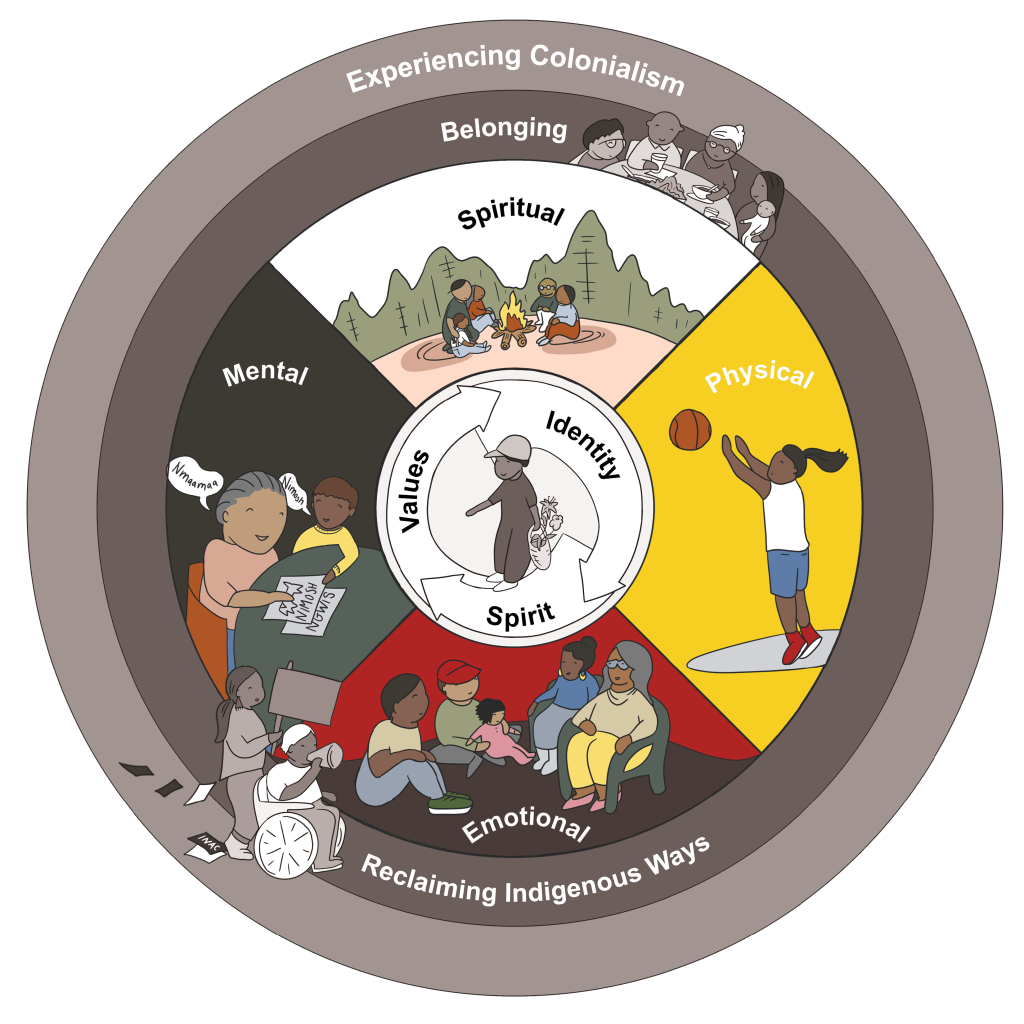 In the following excerpt from Biidaajwan Force of Water [1:28] Nbisiing Debendaagziwad speak about how Nbisiing Nishnaabemwin (Nipissing language) promotes balance in the four elements of our being, how language can connect us with our life purpose, and how language can direct our path in life.
In the following excerpt from Biidaajwan Force of Water [1:28] Nbisiing Debendaagziwad speak about how Nbisiing Nishnaabemwin (Nipissing language) promotes balance in the four elements of our being, how language can connect us with our life purpose, and how language can direct our path in life.
Video Transcript: Theme 02 [Doc]![]()
Checkpoint 20: Quiz
Theme 3: Belonging
Nbisiing Debendaagziwaad felt strongly that family and community could be both a source of support or a challenge for wellness. Family and community were viewed as protective measures surrounding the individual’s experience of colonialism. To belong to a family, community, or Nation reinforces a sense of wellness for the person. One’s spirit, identity, and values influence a feeling of belonging and, in turn, inform how a person lives out the teachings of the Medicine Wheel (Peltier et al., 2022).
The following quote from a Nbisiing citizen reflects the strong sense of community felt by Nbisiing Debendaagziwaad:
“When we moved back here, trying to feel part of the community was a challenge. … People look at you and [ask], Who are you and who’s your mother? …You know, that’s the first thing they want to get into. … You go anywhere else…they don’t start asking you who your mother is, [who] your father is, or your grandmother…Once you’re here, then you understand why. It’s such a small community and everyone wants to know everybody…”(Peltier et al., 2022).
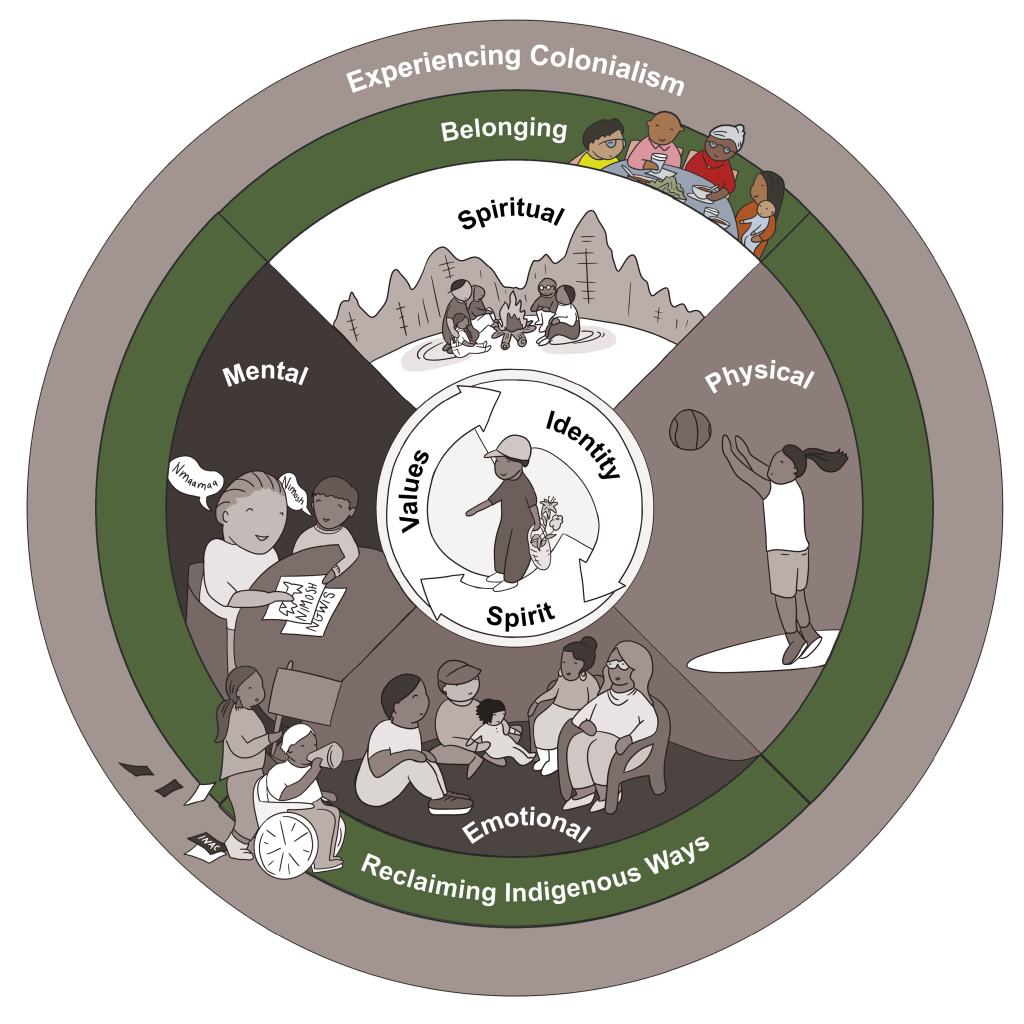 In the following excerpt from Biidaajwan Force of Water [4:21] Nbisiing Debendaagziwad speak about how family and community are integral to learning Nbisiing Nishnaabemwin (Nipissing language). This creates a sense of belonging, pride, and a desire to revitalizing the language for future generations.
In the following excerpt from Biidaajwan Force of Water [4:21] Nbisiing Debendaagziwad speak about how family and community are integral to learning Nbisiing Nishnaabemwin (Nipissing language). This creates a sense of belonging, pride, and a desire to revitalizing the language for future generations.
Video Transcript: Theme 03 [Doc]![]()
Checkpoint 21: Quiz
Theme 4: Experiencing Colonialism
“The residential schools were such a successful thing in this area … there was certainly [many] cases of abuse that came out of there. But abuse in such a way that they felt fortunate they were able to go there and they’re happy that Jesus and God was brought into their life, not realizing the abuse that even that mindset gave them” (Peltier et al., 2022).
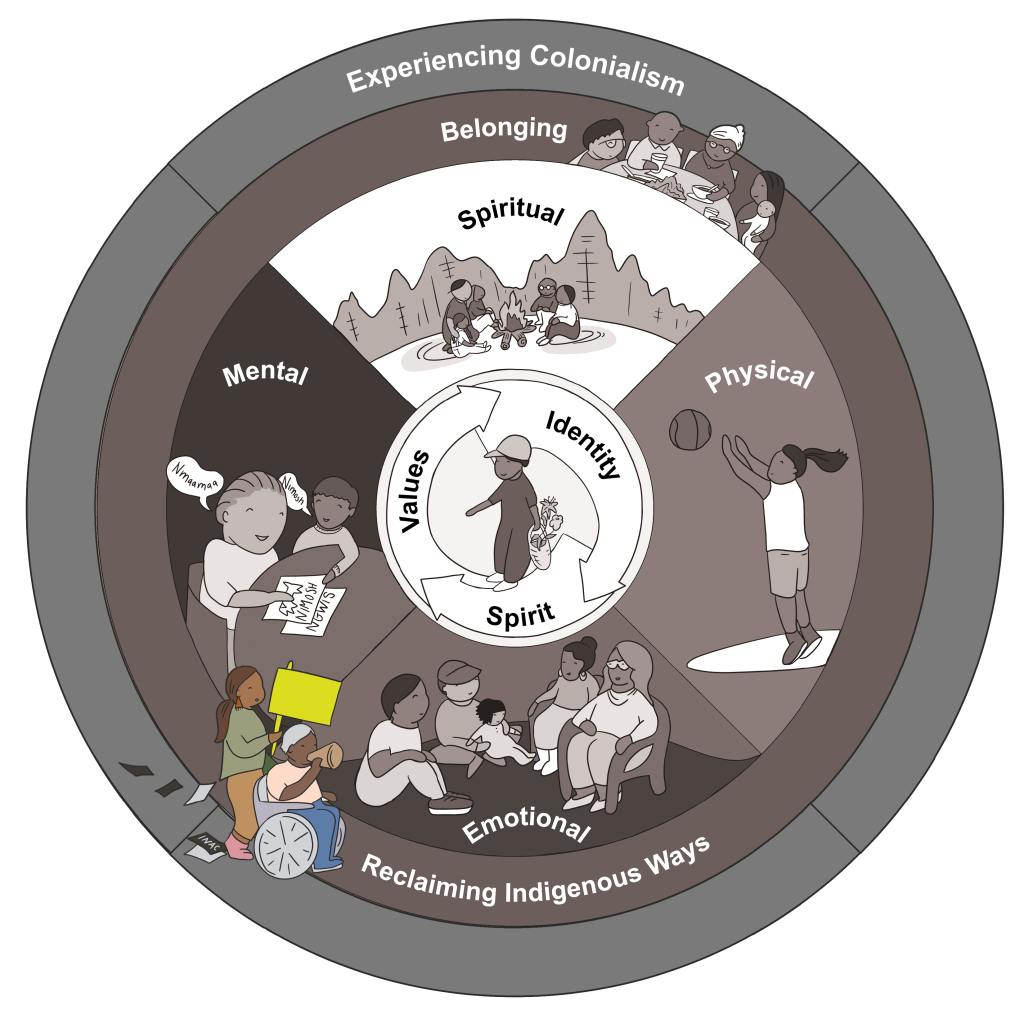
In the following excerpt from Biidaajwan Force of Water [2:40] Nbisiing Debendaagziwad speak about how Nbisiing Nishnaabemwin (Nipissing language) and culture have suffered because of colonialism and how re-learning the language can be challenging.
Video Transcript: Theme 04 [Doc]![]()
Checkpoint 22: Quiz
Theme 5: Reclaiming Nbisiing Nishnaabeg Ways
Wellness is possible when the person can rise to overcome colonialism through Nbisiing Nishnaabeg ways of life and living the Medicine Wheel, through a sense of belonging, and further reclaiming Nbisiing Nishnaabeg ways. Reclaiming Nbisiing Nishnaabeg ways provide the opportunity to reconstruct the effects of colonialism. To this community, reclaiming their ways represents wellness and the opportunity to mitigate the experiences of colonialism.
For Nbisiing Debendaagziwad living a good life is an integrated experience where the spirit connects to Creation. That connection promotes the values one carries, and the formation of positive identities. This sense of connectedness is supported and is made explicit by reclaiming Nbisiing Nishnaabeg ways to wellness (Peltier et al., 2022).
“Education is not just in schools … it’s not just in schools but in our homes … there’s a lot to be gained by going back to the language because the language is not just words. … there’s a way of life in the language” (Peltier et al., 2022).
“Ceremony, the language, those are really big things for me and again, sustainability … just in terms of survival, like old ways of using the land, of farming, of fishing … I think a lot of times tended to be a lot more integrated and a lot less damaging, a lot less harmful. I think that would, just to improve the relationship to one another, to the language, to the culture, to the land … would mean a much stronger, much more wellness in general at a community level” (Peltier et al., 2022).
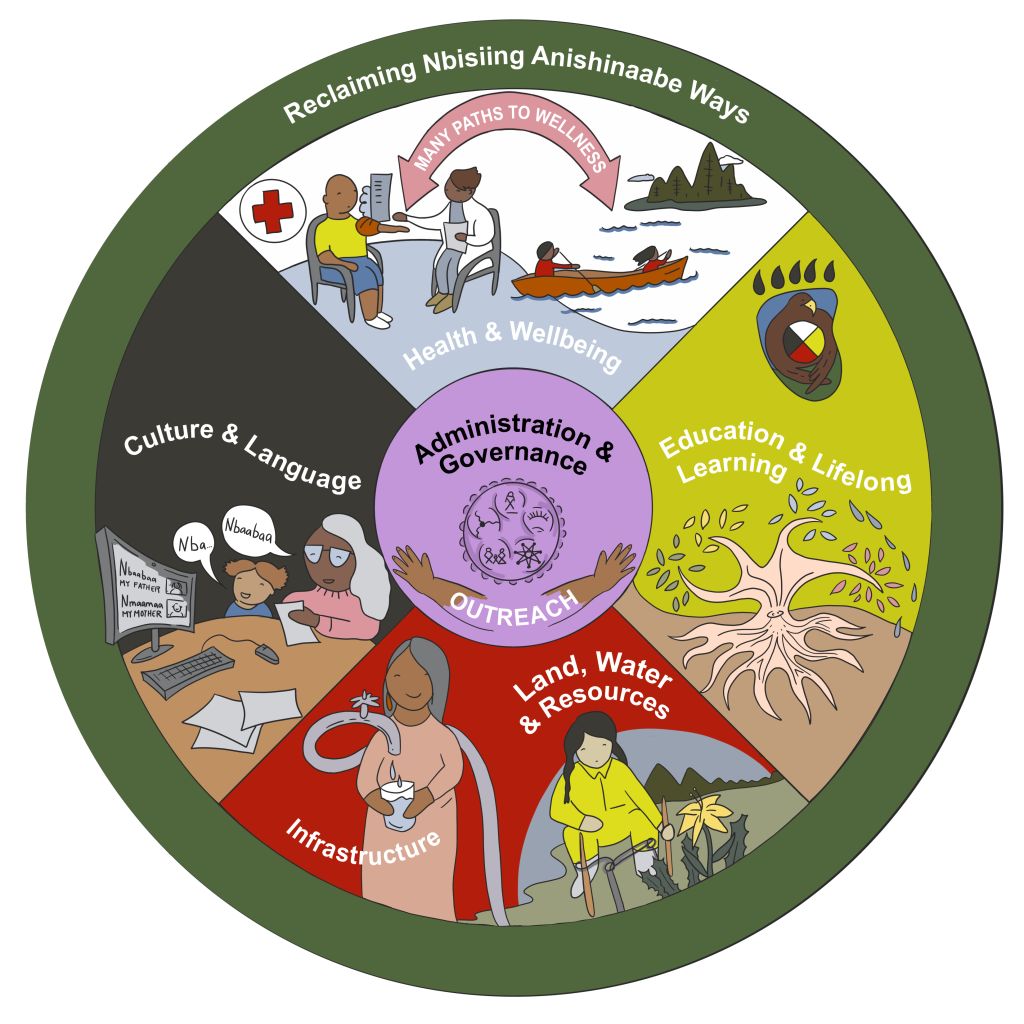 Image Description: Nbisiing Reclaiming Ways to Wellness Model [Doc]
Image Description: Nbisiing Reclaiming Ways to Wellness Model [Doc]![]()
In the following excerpt from Biidaajwan Force of Water [5:12] Nbisiing Debendaagziwad speak about how Nbisiing Nishnaabemwin (Nipissing language) promotes a sense of wholeness and how continuing to work with Elders will keep this language alive.
Video Transcript: Theme 05 [Doc] ![]()
Checkpoint 23: Quiz
Sharing Strength Through Nbisiing Nishnaabemwin
For those interested in viewing the full Biidaajwan Force of Water documentary, visit the Nipissing First Nation Administration YouTube Channel.![]()
Checkpoint 8 Summary
In Connection 8, we learned:
- Nbisiing Nishinaabeg have their own understanding of wellness depicted in a community-based model.
- Wellness depends on a reclamation of their own understandings, ways of being and knowing rooted in their language.

To move on to the Finish Point for Module 1 click on the “Next: Finish Point: Acting on Your Learning Through a Learning Scenario →” button at the bottom right hand corner of this page.
References
Nipissing First Nation & Hummingbird Productions. (2022, July 13). Biidaajwan Force of Water Documentary [Video]. YouTube. https://www.youtube.com/watch?v=Sw4IRC82vSs&t=619s![]()
Peltier, C., Manankil-Rankin, L., McCullough, K., & McLeod-Shabogesic, L. (2022). Wellness and wiidooktaadyang: Moving Anishinaabe knowledge into action [Manuscript submitted for publication]. Faculty of Education and Professional Studies, Nipissing University.

